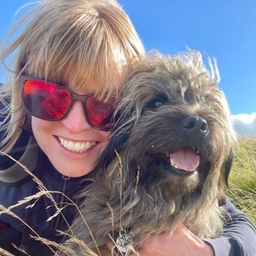
Victoria Gill
Science Correspondent at BBC
@BBCNews science bod. Radio/podcast blabberer. Northerner. Feminist. Has world’s cutest dog. (Frivolous travels / pet worship on insta: sciencey_vic)
Articles
-
1 week ago |
bbc.com | Rebecca Morelle |Alison Francis |Victoria Gill
What are the risks of bombing Iran's nuclear sites? Rebecca Morelle, Alison Francis and Victoria GillReutersA U.S. Air Force F-15E Strike Eagle aircraft releases a GBU-28 "Bunker Buster" 5,000-pound Laser-Guided Bomb over Utah Test and Training RangeThe IAEA has described the attacks on Iran's nuclear facilities as "deeply concerning".
-
1 week ago |
envirolink.org | Victoria Gill
From BBC 5 hours agoShareSaveVictoria GillScience correspondent, BBC NewsShareSaveGlobal WitnessStark images, captured from a drone by environmental campaigners and shared with the BBC, appear to show how nickel mining has stripped forests and polluted waters in one of the most biodiverse marine habitats on Earth. The Raja Ampat archipelago – a group of small islands in Indonesia’s Southwest Papua Province – has been dubbed the “Amazon of the Seas”.
-
1 week ago |
bbc.com | Victoria Gill
Race to mine metals for EV batteries threatens marine paradiseVictoria GillScience correspondent, BBC NewsGlobal WitnessThe Raja Ampat archipelago in Indonesia is sometimes referred to as the 'Amazon of the Seas'Stark images, captured from a drone by environmental campaigners and shared with the BBC, appear to show how nickel mining has stripped forests and polluted waters in one of the most biodiverse marine habitats on Earth.
-
2 weeks ago |
envirolink.org | Victoria Gill
From BBC 1 day agoShareSaveVictoria GillScience correspondent, BBC NewsShareSaveMasato HattoriScientists have discovered a new species of dinosaur – in the collection of a Mongolian museum – that they say “rewrites” the evolutionary history of tyrannosaurs. Researchers concluded that two 86 million-year-old skeletons they studied belonged to a species that is now the closest known ancestor of all tyrannosaurs – the group of predators that includes the iconic T.rex.
-
2 weeks ago |
envirolink.org | Kate Stephens |Victoria Gill
From BBC 3 days agoShareSaveKate Stephens and Victoria GillBBC News science teamShareSaveGetty ImagesRolls Royce has been selected to develop and build the UK’s first small nuclear power stations. It is hoped small modular reactors (SMRs) will help meet the UK’s growing electricity demands, be faster to develop than full size reactors and create thousands of skilled jobs.
Try JournoFinder For Free
Search and contact over 1M+ journalist profiles, browse 100M+ articles, and unlock powerful PR tools.
Start Your 7-Day Free Trial →Coverage map
X (formerly Twitter)
- Followers
- 14K
- Tweets
- 10K
- DMs Open
- Yes

RT @CarolineSteel3: I’m on Radio 4’s Inside Science with @Vic_Gill chatting about science news: - new evidence for the formation of mysteri…

In a few mins on @BBCRadio4, my last Inside Science for a wee while. Dissecting the government’s science funding “boost” , the latest from the UN Oceans meeting & finding out where the heck Planet 9 went. Oh and we have a whole new dinosaur! 🌊 🌍 🦖 https://t.co/qWUeJM5p8E

RT @JackieLeonard01: at 8gmt/9bst #TheNewsroom here ---> https://t.co/R4ir8DZ1ba - 📻 @cookie_gill has the bulletin; @annesoy on the plig…

